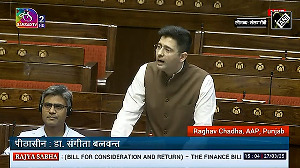If foreigners need reasonable taxes, why offer citizens something else?
If foreign businessmen look for assurance on the rule of law, so do citizens, argues T N Ninan.

There was a time during the prohibition era in Bombay (as it then was) when only foreigners were allowed to drink in hotel bars.
A humour columnist wrote then about his fictional wife walking into the bar of an expensive hotel and ordering a drink.
On being told that only foreigners would be served, she asked the unanswerable question: 'Whose country is this anyway?'
That should be our question, too, every time someone writes or says that we must offer foreigners reasonable tax rates, or good business processes, or special investment windows, or investment enclaves, lest they take their dollars elsewhere.
The usual arguments run like this: The new high income tax rates will make it more difficult to hire expatriates.
Or, foreign portfolio investors will turn away from the Indian market.
Or, we must clean up and beautify our tourist spots, to attract more international tourists.
The obvious question is, why only foreigners?
What about us who live and work here and pay our taxes?
Don't we deserve better tax and other rules, and cleaner towns and cities in which to live and work?
Or is the Indian citizen to be treated differently because s/he is a captive, without means of escape?
Well, India is no longer the economic prison that it used to be, when all that you could take out of the country was 8 dollars.
Later, under a liberalised foreign travel scheme, you could take out a generous $100.
We weren't as bad as the old Soviet Union, which ran the Beryozka supermarket, where only Western tourists could shop (predictably, the Soviet elite, too, found a way to shop there).
Or China, where for years foreigners could deal only in specially issued foreign exchange certificates.
But it was bad enough.
Most closed systems have opened up, including India's.
No government in its right mind today would try imposing such rules, and, if it did, it wouldn't work.
Not that it worked earlier.
All that Indian money in Swiss banks and other tax havens didn't materialise out of thin air.
Smuggling was rampant at the time, and the hawala trade flourished.
Some of the money round-tripped back as investment from overseas.
There was a period when Indians also started coming back.
It helped that the domestic environment improved: New private hospitals and schools responded to the demand for better health and education services.
Cars, phone connections and air services, all got better.
And yet, recent years have seen wealthy and professionally successful Indians voting with their feet, or air tickets.
One plausible figure has it that 150,000 top-strata Indians have emigrated in recent years to Dubai, Singapore and western shores.
They were initially running away from tax terrorism, a term born out of Pranab Mukherjee's 2012 Budget.
Then came new rules about the place of effective business, which induced many to change their residential status.
Others have followed because of the worsening air pollution in cities, the impossibilities of school admission, and now the lack of water.
It is easier to leave than before.
Millions of Indians have acquired international degrees, or high-quality Indian ones, that make them globally saleable.
The many millions of non-residents in the US, West Asia and elsewhere translate into kinships that facilitate emigration.
Countries like Australia target Indians as desirable immigrants, partly to neutralise the effect of a Chinese influx.
In short, relatively large numbers from the class of Indians vital to taking the economy forward can leave, and have been doing so.
So we need to treat citizens like they have a choice, even if most of them don't.
If foreigners need reasonable taxes, why offer citizens something else?
If foreign businessmen look for assurance on the rule of law, so do citizens (including, or especially, the government's critics).
'Ease of Living' is a great concept -- offering, for instance, automated protection from the tax official's grasping fingers.
But let's not offer special treatment to help foreigners escape the rigours of our rules and laws.
That is what closed and oppressive systems do.
Let's do things for all, including citizens, as an open democracy should.












 © 2025
© 2025